Eduwatch Briefs Parliament's Education Select Committee On Gaps In Basic Education Delivery
| 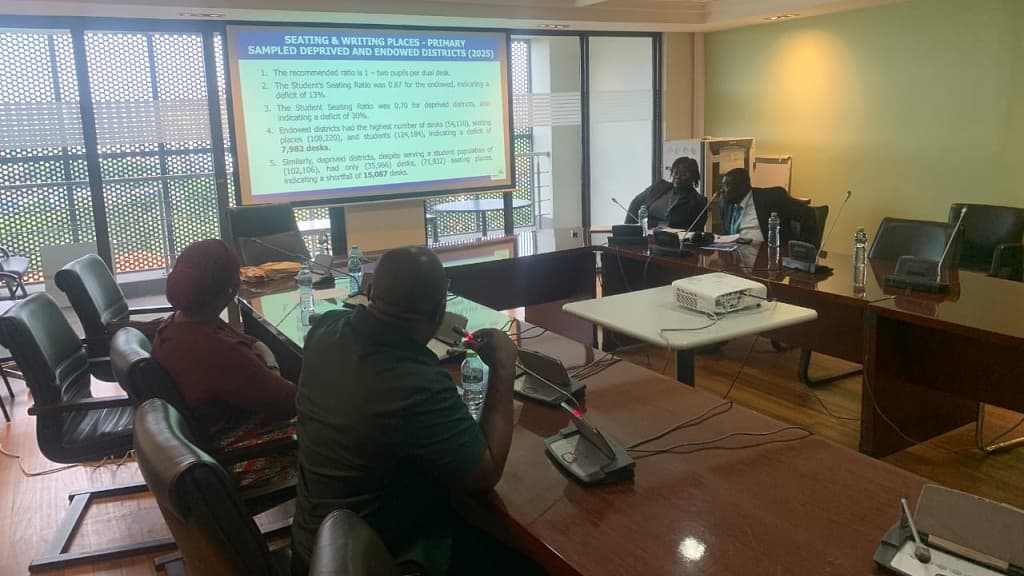 | |
|
On Thursday, June 19, Eduwatch honoured an invitation from the Parliamentary Select Committee on Education to present findings from its citizens-led review of Ghana’s Education Sector Medium Term Development Plan (ESMTDP 2022–2025). The engagement was timely in enhancing Eduwatch’s objectives to influence inclusive, evidence-based basic education policy formulation for the next ESMTDP (2026–2029).
Presenting findings from Eduwatch's review of the ESMTDP (2022-2025), the Executive Director, Kofi Asare focused on performance disparities across key education indicators in deprived and endowed districts, and called the Committee's attention to structural and planning gaps that continue to constrain equity and quality. Key findings from the review included the following:
1. Primary 6 to JHS 1 transition rates in deprived districts remain significantly below national targets due to the absence of Junior High Schools (JHS) within reach of primary school graduates.
2. Many schools in deprived communities either lack toilet facilities entirely or have unsafe, gender-insensitive infrastructure - a situation which disproportionately affects girls, undermines retention, and compromises student dignity and hygiene.
3. The Ghana School Feeding Programme (GSFP) disproportionately benefits urban districts with lower poverty levels, while highly deprived rural districts remain underserved, despite greater need.
4. Since 2023, gross enrolment at all basic levels has declined in both deprived and endowed districts. This decline is more pronounced in areas with poor infrastructure and long-standing access barriers.
5. In deprived districts, School Improvement Support Officers (SISOs) face challenges related to inadequate transport and funding, limiting their ability to supervise and support teaching and learning effectively.
The following key recommendations were proffered to inform the next planning cycle (ESMTDP 2026-2029) and promote equitable delivery of basic education:
1. Parliament should ensure that the next ESMTDP prioritises school infrastructure development to bridge the transition gap between primary and JHS in deprived areas.
2. The Ministry of Education should include gender-responsive WASH indicators and targets in the next ESMTDP, and embed WASH monitoring within the Education Management Information System (EMIS) to support accountability and resource allocation.
3. The Ministry of Gender, Children and Social Protection should realign the targeting of the GSFP with the national poverty index, ensuring rural and high-poverty districts receive priority.
4. The next ESMTDP should include clear, district-level enrolment recovery strategies backed by infrastructure investment and re-engagement campaigns in low-enrolling communities.
5. Parliament should engage the national association of SISOs and advocate for a responsibility allowance, similar to that received by headteachers, to strengthen motivation and supervision quality in deprived areas.
In response, the Committee commended Eduwatch’s evidence-led approach and pledged to engage the National Development Planning Commission (NDPC) to ensure the findings and recommendations are reflected in the development of the next ESMTDP (2026–2029).
Eduwatch was represented by its Executive Director, Kofi Asare, Research Associate and Gender Lead, Sahadatu Ali and Data Analyst & MEL Officer Godfred Kofi Agyei. The full research report will be published once finalised.
© Africa Education Watch | |
|
|
|
Eduwatch Participates In Civil Society-Government Dialogue On Financing For Development
| 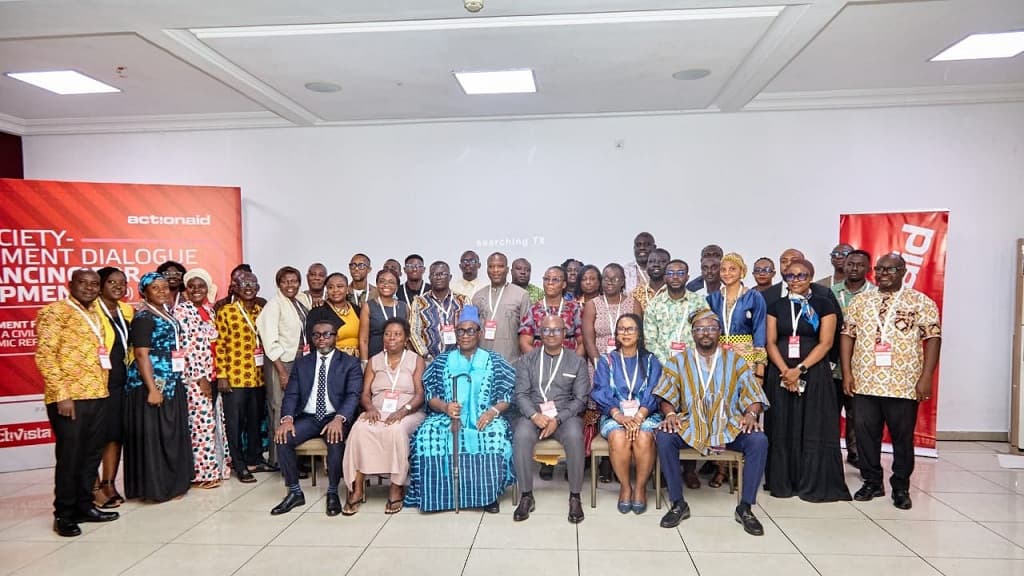 | |
|
On Friday, June 20, Eduwatch participated in a CSO meeting on a Financing for Development (F4D) project, being implemented by ActionAid Ghana (AAG). The meeting, themed "Reviewing Development Financing for People and Planet: A Civil Society-Government Dialogue for Systemic Reform", aimed at addressing the pressing economic challenges confronting Civil Society, Organisations and Governments in Ghana and across the Global South.
A presentation by the West Africa Civil Society Institute (WACSI) on "Innovative and Practical Solutions to Financing for Development in Ghana - A Civil Society Perspective", highlighted the need for blended finance, comprising private, donor, and government funding, as well as a national philanthropic policy to regulate philanthropic funding, Public-Private Partnership models, and Patient capital. The presentation posited that these models could be developed to fund various projects, in the face of the drastic decline in donor funding.
Special Purpose Models, including a Green bond for climate-smart agriculture and solar energy, and a Blue bond for ocean conservation and coastal infrastructure, were also recommended. It was concluded that ‘innovative financing is not only about new money but also, using what you have in a better way’.
Participants in the dialogue were drawn from the Ministries of Finance, Gender and Social Protection, Energy & Green Transition, and Local Government and Rural Development. Other participating institutions included the Ghana Revenue Authority, Natural Resources Institute, Bank of Ghana, and CSOs, including the Centre for Indigenous Knowledge & Organisational Development (CIKOD) and WACSI. Eduwatch was represented by our Programme Management Specialist, Kofi Nkansah-Sarkodie.
© Africa Education Watch
| |
|
|
|
Eduwatch Participates In The Savannah Climate Conference 2025
| 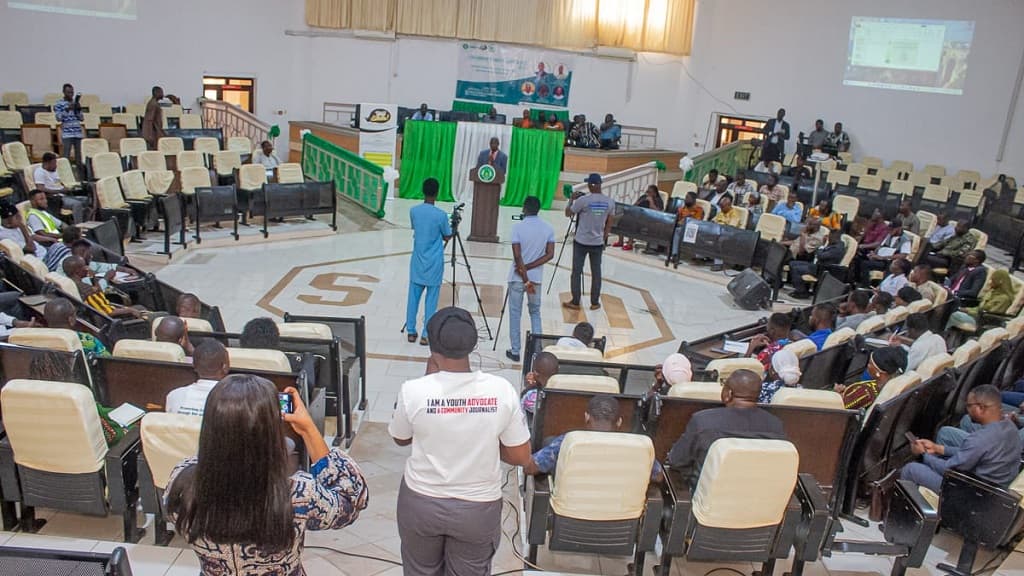 | |
|
On Wednesday, June 25, Eduwatch participated in the Savannah Climate Conference at UDS in Tamale, organised by the Youth Empowerment for Life (YEfL). Held under the theme “Savannah Solutions: Local Actions with Inclusion, Innovation and Impact”, the objective of the Conference was to engage in strategic dialogue and joint reflection on the escalating impacts of climate change in Ghana’s Savannah Ecological Zone.
The conference identified several critical challenges confronting the Savannah Ecological Zone. Prominent among these was the widespread and unsustainable production of charcoal, leading to rapid deforestation and degradation of fragile ecosystems. Participants also noted the persistent capacity gap at the district and municipal levels, which hindered effective climate-responsive planning and implementation.
The findings from a research on the drivers and climate impact of commercial charcoal burning generated concerns, including the limited availability and affordability of clean and modern energy alternatives for both rural and urban households. The underutilisation of indigenous knowledge systems, and the limited participation of youth and women in climate-related decision-making processes were highlighted as key barriers to inclusive and sustainable outcomes.
Due to issues emanating from the Conference, a regional Savannah Climate Action Roadmap was adopted. The roadmap, among others, recommended the strengthening of Local Governance capacity, a reform and regulation of the Charcoal Sector and an expansion of access to clean and renewable energy. Stakeholders also called on the Government of Ghana, development partners, private sector, and all citizens to support the full implementation of the Roadmap.
Participants in the Conference were drawn from local government, traditional leadership, academia, civil society, the private sector, youth networks, and development partners. Eduwatch was represented by its Programme Officer, Kwasi Nimo Jnr.
© Africa Education Watch
| |
|
|
|
Eduwatch Hosts Validation Meeting For A Gender Transformative Review Of Ghana's Standards-Based Curriculum
| 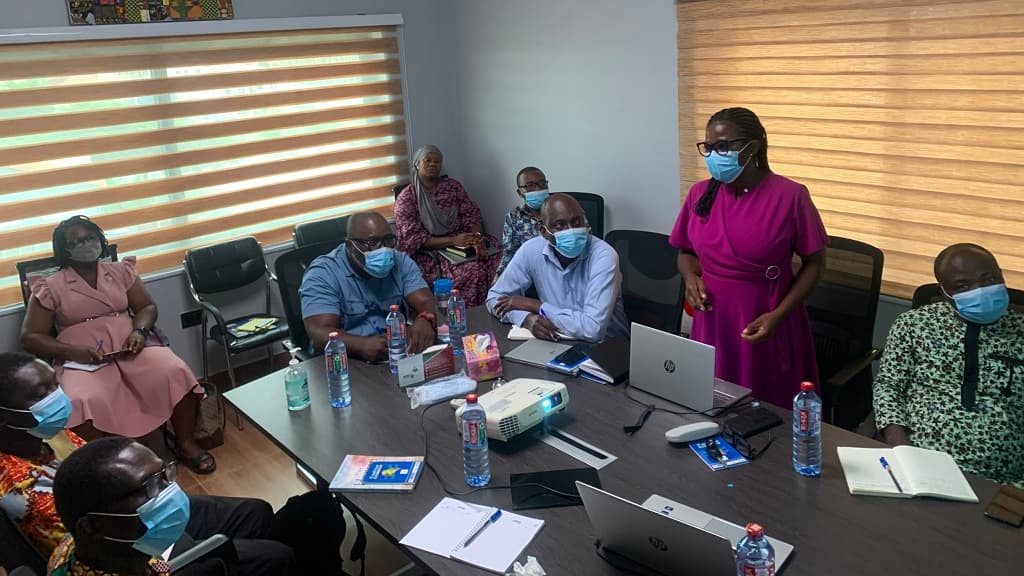 | |
|
On Thursday, June 26, Eduwatch convened a stakeholder meeting at its conference room, to validate the preliminary findings of a Gender Transformative review of Ghana’s Standards-Based Curriculum (SBC) for Kindergarten to Primary 6 learners. The study forms part of activities being implemented by Eduwatch under the Strategic Partnership (SP) II Project, with support from Oxfam, aimed among others at ensuring that Ghana adopts an improved education policy framework that is gender-transformative, inclusive, and benefits diverse groups of young people and girls.
Presenting findings from the review, Justice Quartey (the consultant) highlighted critical gender gaps in curriculum content, pedagogy, assessment frameworks, and textbook representation, setting the tone for a robust discussion on strengthening the gender responsiveness of the SBC. Key findings included the following:
1. Ghana’s curriculum and assessment frameworks express strong gender-equity intentions but lack the practical tools, strategies, and indicators needed to drive classroom-level transformation.
2. While inclusive in tone, many National Council for Curriculum and Assessment (NaCCA)-approved textbooks still reflect male dominance in leadership, public service, and STEM-related roles, limiting aspirational visibility for girls.
3. Across subjects and grade levels, there is little structured content that builds girls’ confidence, leadership or voice, especially in areas like science, mathematics, and class participation.
4. Boys are not intentionally positioned as advocates for gender equality. There is a missed opportunity to develop their roles in fostering respectful, supportive, and inclusive classrooms.
5. Although participatory learning is promoted, teachers are not guided on how to manage gender dynamics or challenge harmful stereotypes in pedagogy or learner engagement.
Key recommendations from the review include the following:
1. Teachers need locally relevant visual aids, storybooks, activity guides, and structured lesson plans to support gender-transformative instruction.
2. Teachers should be equipped through training and guidelines to foster equal participation, challenge biases, and promote assertiveness among all learners.
3. Classroom activities should actively question traditional gender norms and foster learner dialogue on fairness, power, and roles.
4. Teaching and Learning Materials must include and portray female figures excelling in STEM, leadership, and innovation, alongside boys practicing gender allyship and positive masculinity.
5. Curriculum content should intentionally feature public speaking, group leadership, and problem-solving roles for girls, to foster early empowerment.
In discussions that followed the presentation, stakeholders noted that while NaCCA is the institution with the legal mandate to develop curricula, its current lack of involvement in implementation monitoring presents a critical oversight gap. There was consensus that Ghana’s curriculum framework needs to shift from gender awareness to true gender transformation. There were also concerns that the curriculum does not promote diverse perspectives and often avoids direct engagement with gender issues due to their perceived conflict with certain cultural norms.
In response to the emerging issues, stakeholders called for stronger advocacy to influence policymakers and community leaders to confront harmful cultural beliefs that reinforce gender inequality. They further posited, that the purpose of curriculum design must transcend schools and reflect wider societal transformation. Teachers, they argued, must be supported and empowered to deliver gender-transformative pedagogy.
Additionally, NaCCA was encouraged to develop gender-based monitoring indicators, engage stakeholders more broadly during curriculum design, and operationalise its monitoring role more effectively. It was also proposed that the next curriculum framework should explicitly include gender transformation as a stated objective.
As part of the next steps, Eduwatch will finalise and disseminate the full report to stakeholders in the coming weeks. Also, engagements will be initiated with Parliament, the Ghana Education Service (GES), and the National Development Planning Commission (NDPC) to advocate for the integration of these recommendations into the Education Sector Medium-Term Development Plan (2026–2029).
Stakeholders at the validation meeting included representatives from NaCCA, the Ayensuano, Ga East and Weija Gbawe District Education Offices.
© Africa Education Watch
| |
|
|
|
Eduwatch Participates In The Launch Of The Open Government Partnership (OGP) Parliamentary Action Plan & Commemoration Of World Parliament Day 2025
| 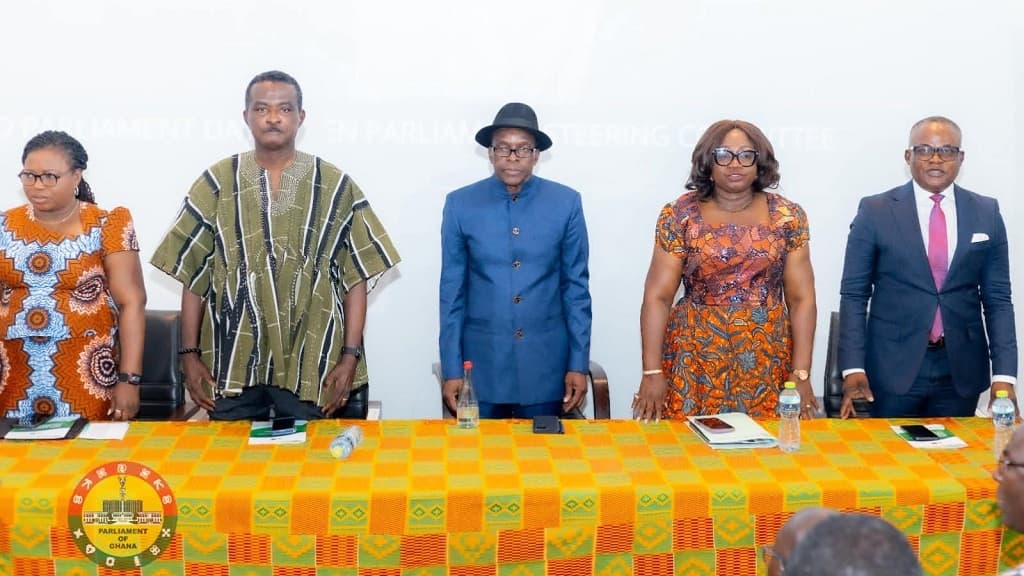 | |
|
On Monday, June 30, Eduwatch participated in the launch of the Open Government Partnership (OGP) Parliamentary Action Plan at Ghana's Parliament House in Accra. On the sidelines, Parliament also commemorated the International Day of Parliamentarianism, and inaugurated the OGP Steering Committee. The gathering was held under the auspices of Ghana's Speaker of Parliament, Rt. Hon. Alban Sumana Kingsford Bagbin.
In his Keynote Address, the Speaker stressed the urgent need to enhance transparency and accountability in Parliamentary proceedings, and the need for Parliament to debate, assess, review, own and actively assist the implementation of government policies. The Speaker urged Parliamentarians and Staff to prioritise the robust implementation of the OGP Parliamentary Action Plan.
While stressing the need for purposive action to build structures to ensure more female representation in Parliament, the Rt. Hon. Speaker called for effectiveness in ensuring provisions of the Affirmative Action (Gender Equality) Act, 2024 (Act 1121) are implemented by all political parties and bodies, and supported by a nationwide civic education led by the NCCE to foster and deepen women's participation in governance.
Announcing certain Parliamentary resolutions, the Speaker indicated that by end of the year, all proceedings in Parliament will be live on National Television (Parliament TV) to engender Transparency and Accountability. He stated that all reports of MMDAs and Institutions submitted to Parliament will be debated and peer-reviewed for accountability, adding that plans are far advanced to ensure that Members of Parliament are allowed to address the House in their mother tongue per the new Standing Orders.
Participants at the engagement were drawn from Civil Society, Parliament, Education Institutions, Corporate Ghana, Traditional and Faith-Based Organisations. Eduwatch was represented by its Programme Officer, Kwasi Nimo Jnr.
© Africa Education Watch
| |
|
|
|
|